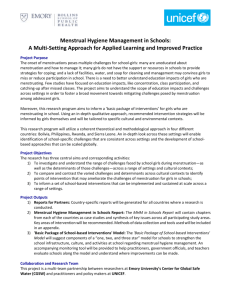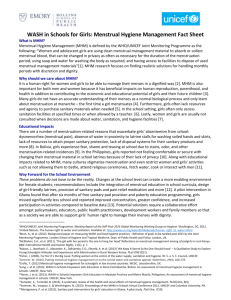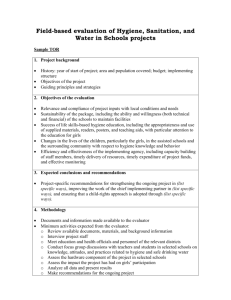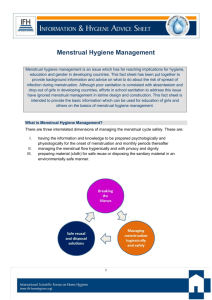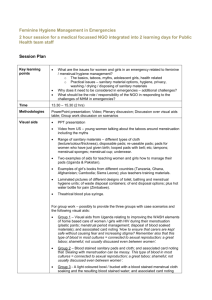Untitled - UN Global Compact
advertisement
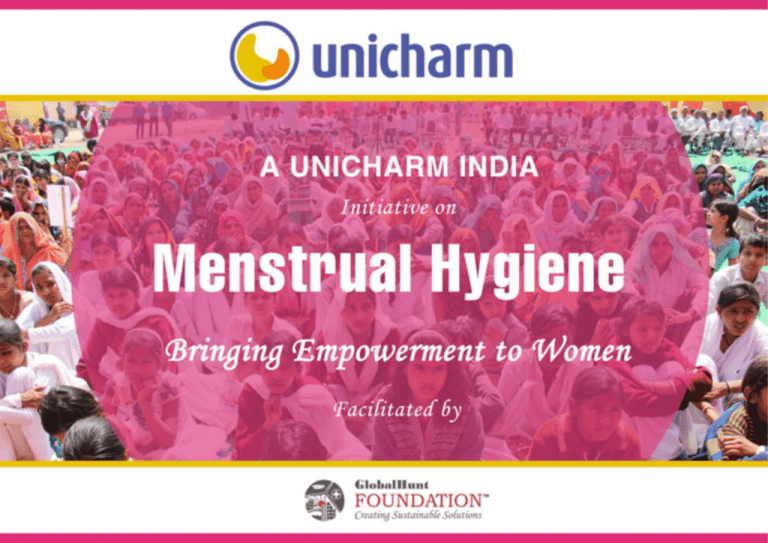
About Unicharm India Limited Unicharm India was established in 2008 as an extended arm of the Japanese based Unicharm Corporation that has extended its sale and services through baby and child care products, feminine care products, health care products, cosmetic products, household products,pet care products, industrial materials and food-packaging materials. Unicharm India Limited has launched products primarily in child healthcare with MamyPoko Pants, MamyPoko Baby Wipes and in feminine health care through its brand Sofy. About GlobalHunt Foundation (GHF) GlobalHunt Foundation is a Research, Advisory and a Consulting organization, it is registered as a Section 25 company under the Indian Companies Act. 1956. As a Signatory to the United Nations Global Compact, the foundation operates on a partnership for all principles and aims to offer conglomerate of services towards fostering social responsible practices of leading corporates and diverse multi stakeholders on the lines of sustainable development framework. Research Lead by: Radhika Ralhan, Corporate Sustainability, GHF Research Assisted by : Mehak Kaushik, GHF Designed by: Yogesh Sharma, GHF Photos © GHF Photo/ Yogesh Sharma Copyright@2014 GlobalHunt Foundation Office New Delhi E-45/6, Okhla Phase-II, New Delhi – 110020 Board +91 11 4654 7700 Direct +91 11 4626 7806 Mobile +91 81 3092 3939 Email corporate@globalhuntfoundation.org Website www.globalhuntfoundation.org When from my cheek I lift my veil, The roses turn with envy pale, And from their pierced hearts, rich with pain, Send forth their fragrance like a wail. Or if perchance one perfumed tress Be lowered to the wind's caress, The honeyed hyacinths complain, And languish in a sweet distress. And, when I pause, still groves among, (Such loveliness is mine) a throng Of nightingales awake and strain Their souls into a quivering song. The Song Of Princess Zeb-Un-Nissa In Praise Of Her Own Beauty by Late. Shree Sarojini Naidu ¹http://www.poemhunter.com/poem/the-song-of-princess-zeb-un-nissa-in-praise-of-h / Foreword 5 Executive Summary 6 Menstrual Hygiene: Achieving the Right To Dignity & Respect 7 Global Menstrual Scenario 9 The Indian Scenario 11 Suppressed Voices 13 Cultural Connotations to Menstruation in India 14 Menstruation: Myths and Misconceptions 15 Sanitary Pad Revolution in India 16 Advent of Unicharm Corporation 17 Unicharm CORP Feminine Product Care Timeline 18 NOLA & DOLA :Necessity of Life with Activities, Dreams of Life with Activities 19 Unicharm Feminine Care Products 20 About the Women Empowerment Programme 21 Conclusion 26 Foreword I am pleased to assert that Unicharm Corporation has always believed in the philosophy of Nola Dola for carrying out its diverse programmatic interventions that also connotes our social and responsible business operations globally. As our Asian counterpart, India with its diverse terrain, culture and population in contemporary times is facing challenges with respect to environmental catastrophes, women’s health that have escalated with time mainly due to the existence of traditional notions and cultural taboos. As a UNGC signatory, the company has committed itself to carry forward the universally ten accepted principles especially in the areas of human rights and environment. Women empowerment has been a crucial facet to the Unicharm social sustainability initiatives, our company has been fostering the UN Millennium Goals within our diverse global operations such as India ,with prime emphasis Goals 3 and 5 pertaining to promote gender equality, maternal health in order to achieve the true essence of women empowerment that have been amiss for centuries. As we are now advancing to the post 2015 world WASH – water, sanitation and hygiene has emerged as a pivotal concern. This is Mr. Yukihiro Kimura Managing Director - Unicharm India especially with respect to clean sanitation, hygiene awareness and its implementation as a practice among women and children. It is in this respect, that I also believe that menstrual hygiene and its management has also occupied an austere issue for the complete fulfillment of women’s health and empowerment. Through our Indian operations in form Unicharm India Pvt Ltd, we have conducted awareness programmes related to Menstrual Hygiene especially for the rural sections of populations. The main objective of these programmes are to impart education and disseminate factual awareness on puberty issues, advent of first menstruation, bursting myths and cultural taboos, encouraging girls to share their experiences and answering their queries and related concerns. One of the key imperatives of the programme is to achieve clean menstrual hygiene related to the use of hygienic sanitary products and its safe waste disposal. It gives me immense pleasure that one such large scale program on the theme of generating awareness on Menstrual Hygiene was conducted to mark the Women Empowerment Day, on 8th March 2014. The programme included more than 900 beneficiaries comprising of young adolescent school going girls and the rural women of Machhgar Village situated nearby the capital city of New Delhi. In our endeavors, we have always believed in promoting gender equality through our programmes, initiatives that are centered around health and well being of girl child and women especially those situated at the bottom of pyramid. 5 Executive Summary The GlobalHunt Foundation as an esteemed signatory to the United Nations Global Compact (UNGC) in its efforts has always ensured to instill the Ten Universal Accepted Principles of the UNGC in all its diverse programs, activities, and policies. The Foundation views Women Empowerment as an extension towards the fulfillment of Principles 1 & 2 under the defined areas of Human Rights. The Foundation as a knowledge catalyst operates on a “partnership for all” principle where by it has successfully mobilized corporates to collaborate closely with other civil society organizations towards promotion of programs that bear the spirit of community self awareness, empowerment and inclusiveness. The engagement of Unicharm India Pvt. Ltd. in supporting the Women Empowerment program has also been formulated on the above lines, the program organized on the occasion of Women Empowerment Day signified the serious commitment of business to implement gender equality principles. The issue of Menstrual Hygiene is a rising concern, as without providence of basic facilities such as water, Ms. Tanu Goel Director GlobalHunt Foundation sanitation, lavatories ,the ultimate objectives of women health, empowerment, equal access and opportunities will remain a utopia for the globalised world. In order to address the growing concern related to women’s health and menstrual hygiene the Foundation believes to foster partnerships among diverse stakeholders towards providing opportunities, equality, addressing crucial issues of the post 2015 sustainable agenda constituting health, water, sanitation and hygiene especially for the most vulnerable sections of the population comprising of women and young girls. The report conceived by GlobalHunt Foundation is an extension to the outreach programme, as it also entails research, issues and concerns that are imperative to any community for consultation and advocacy. I strongly believe that the present engagement formed towards the enhancement of access and awareness related to women’s sanitation is very close to both Unicharm India Pvt Limited and the GlobalHunt Foundation. In the coming time, I am confident that this significant partnership will be extremely useful to further escalate the Women centric WASH agenda through the generous support of Unicharm in diverse regions within the vulnerable sections of population across India. 6 Menstrual Hygiene: Achieving the Right To Dignity & Respect Water, Sanitation and Hygiene have emerged as world will miss this MDG target of improved health imperative concern areas especially in the Post sanitation, as around 2.4 billion people in the hygiene, awareness, waste disposal of sanitary 2015 Sustainable World. The area of WASH is post 2015 world will lack access to improved napkins or no utilization of safe methods during viewed in a dichotomous relation with human sanitation. One of the crucial concerns over the menstruation has gained utmost importance rights and women empowerment, the lack or no severity of the above factual analysis is that within the overall achievability of the SDG target access to basic sanitation, amenities in many women, young girls constitute one of the most for the world. The lack of safe sanitation has one countries of the world by large sections of affected highest of the most adverse affects on the lives of women population is viewed as a grave violation of implication with respect to unsafe sanitation and comprising the urban and rural communities, it human rights and the right to live with respect complete unawareness on hygiene issues within is viewed as one of the grave gender inequalities and dignity¹. On observing the fulfillment of the the population world wide. Moreover, sanitation that is being faced at present in the globalised MDGs it has been well recognized now that the has now encompassed the issues of women world. sections that face the Menstruation - A Global Challenge² • Globally, approx. 52% of the female population is of reproductive age. • 300 million women and girls will be menstruating. • A total of 3,500 days of their lives will be spent bleeding. • Every month, an average of 2-7 days most women and girls menstruate. • More than 300 million women and girls lack access to safe menstrual hygiene products³. 1. 2. 3. Global Thematic Consultation on Water and the Post-2015 Development Framework .WATER IN THE POST-2015 DEVELOPMENT AGENDA. March 2013. http://www.beyond2015.org/sites/default/files/Position%20paper%20Water.pdf (Accessed April, 2013). Girls Globe. Breaking the Silence on Menstruation and Hygiene for Adolescent Girls, March 07,2014. http://girlsglobe.org/2014/03/07/breaking-the-silence-on-menstruation-and-hygiene-for-adolescent-girls/ (Accessed March 2014). Water Supply and Sanitation Collaborative Council. “Celebrating Womanhood: Menstrual Hygiene Management Break the Silence”. 7 especially pertaining to menstrual 8 Global Menstrual Scenario Girls and women who use unhygienic methods are 70% more likely to contract reproductive tract infections, compared to women who use sanitary towels. NEPAL 89% of girls and women are prevented from activities such as preparing food, travelling, and attending school. BANGLADESH KENYA 80% of menstruating girls and women use old cloth 73% of women miss work unpaid for an average of six days per month. Women on their periods are not even considered fit to enter into a goats den or walk near livestock, and are not allowed to eat their meat or drink their milk. 9 BURKINA FASO Sanitary protection materials are carefully hidden for fear that other women may use them in black magic to cause infertility. BOLIVIA Menstrual blood as an extension of themselves, which effects the manner in which girls dispose of their sanitary materials. They bury used menstrual pads, which is unhygienic. Source : SOS Children Villages. Social Taboos Damage The Health Of Girls And Women. March 06, 2014 . Accessed April, 2014 http://www.soschildrensvillages.org.uk/news/charity-blog/social-taboos-damage-the-health-of-girls-and-women NIGERIA Women maintain separate quarters during her cycle. Unsustainable disposal of pads or do not wash old cloths as they fear and worry to witchcraft attacks. IRAN 48% of girls believe menstruation is a disease. The Indian Scenario An underlying silence, stigma, hesitation and taboo exists world over with respect to menstruation. Women and especially young girls face the burden of this unspoken issue to the core which has been a result of lack of awareness, knowledge and sensitization of the issues pertaining to their body, menstrual hygiene, management, puberty and maternal health. A Prolonged Silence In India, menstruation is considered rags, dried leaves, newspapers, ash to as a social-cultural taboo which is prevent the flow of menstrual blood. being universally observed among the The taboo of menstruation and the diverse sub cultures, religions, states associated residing in the country. These taboos attached have resulted in widespread myths, menstrual hygiene in India where as health concerns, restricted mobility, per and has also led towards curbing of accounted to 27% of world’s cervical freedom and empowerment cancer of the stigma to the it has WHO deaths- that has been resulted poor statistics the it incidence has rate women. One of the most vulnerable almost twice to the global average groups rate. The social stigma is coupled comprising the above are young adolescent girls in India, many with who have just reached puberty and amenities, clean toilets, waste disposal have their first periods at an average mechanism, lack of communication age to from teachers, families to orient and embarrassment, shame, hesitation the aid young girls about the changes that young girls are susceptible to serious advent in their body, the result - a health hazards. They are exposed to huge drop out rate is observed in India unhygienic methods and unsanitary from school. of 14 years. Due materials such as the use of dirty 11 lack or no access to basic Despite the social discomfort that the young girls in their menstrual days might face from their male classmates, it is in fact the absence of clean, safe and secure facilities that are primarily responsible for many of them dropping out of school. It has been estimated by UNICEF that in India adolescent school going girls within the age of 11 to 12-years-old, mostly experiencing first time puberty or menses drop out from schools, as in India 66 % of girls’ schools do not have functioning girls’ toilets. In addition to an absent health infrastructure, in India menstruation has been associated with varied social, religious and cultural restrictions. The effect of an absent health support system conjoined with cultural and social myths attached to menstruation denies a woman her other basic right such as of education, health, movement, and the right to live. Menstrual Restrictions on Women in India “ •23 % of girls in India leave school when they start menstruating. •Only 12% Menstruating Women use sanitary napkins. - WSSC, 2013 You always have a girl in white jeans, jumping over a wall, They never talk about hygiene. -Arunachalam Muruganantham India’s Sanitary Pad Revolutionary6 “ India experience a drop out rate of More than 40% after finishing year 5. - UNICEF Menstruation in societies world over has been primitive viewed as a universal taboo for societies all over included notions of uncleanness, bodily excretions, the world. The sociological research also revealed fluids, remainders and hence menstruation, blood that societies distinguished between “purity” and flowing “pollution” as discussed by the famous sociologist symbolic representation of the manner in which Homo (1966) societies perceive dirt, unhygiene, uncleanness. described the established rules of distinctions Therefore, societies directed their every day life and between uncleanness, established cultural connotations to menstruation pollution or taboo. Moreover the social norms, as being ‘impure’. Eventually the rites de passage rules and regulations which were required by men of a woman requires her to follow and observe and especially women to follow in the society and diverse practices, regulations related to menstrual culture were often categorized within the notions of pollution with an aim towards reducing risk and sacred and profane as highlighted by James Frazer danger. However, over the time as societies have in Golden Bough (1890). The traditional societies moved therefore devised ways of clearly demarcating, confusions and the prescribed rules between ordering and controlling sources of pollution, with holiness and pollution has led to anomalous the consequences in form Louis Dumont in holiness overall goal Hierarchicus (purity) to protect and their social and was from viewed simple to anthropologist Mary Douglas in her study Purity implications for women. and Taboo (1966) explained that the concepts of civilizations. universally taboos and Danger : An Analysis of Concepts of Pollution and complex cosmological orders5 In a similar spirit, famous purity and pollution were clear demarcates of the 4. 5. 6. and stigma complex as Pollution the cultures most the of myths, superstitions, that has raised dire 70% of all reproductive diseases in India are caused by poor menstrual hygiene & affects maternal mortality. Bloomberg. No Menstrual Hygiene For Indian Women Holds Economy Back. July, 25,103. Accessed March 2014, http://www.bloomberg.com/news/2013-07-24/no-menstrual-hygiene-for-indian-women-holds-economy-back.htm. Pollution and purity (Anthropology). Accessed March 2014, http://what-when-how.com. BBC World New. “The Indian sanitary pad revolutionary”. 4th March, 2014. Accessed March 2014 , http://www.bbc.com/news/magazine-26260978 Suppressed Voices Delhi 88% of women in India resort to using ashes, newspapers, dried leaves and husk sand to aid absorption. 132 public toilets for women, only 8% the number of the 1,534 for men Delhi Capital of India. Rajasthan “I got my menses when I was thirteen and till that very time, I had no information about what Menstrual cycle was. My grandmother makes me sleep separately and does not even let me enter the house kitchen.” -Deepali, Udaipur Jharkhand “During my period, there was a lot of blood and I was feeling dizzy. I used to face a lot of problems to keep clean.” -Rina Kachhap, Jharkhand (dropped out of school at age of 13.) West Bengal “I preferred to stay at home rather than going to school during those days of menstruation because there was no availability of cloth and running water in the toilet. We faced so much trouble during those days.” -Ambika Khatua, Medinipur Tamil Naidu “There was no privacy to change when required and I was hesitant to seek permission to go home. The agonizing pain, cramps and shame almost forced me to stay away from school.” -Asha ,Tamil Naidu 77% of women in India use an old cloth which is often reused Angela Walker. “Menstrual Hygiene and Anaemia Prevention Key to Keeping Tribal Girls in School”. UNICEF 2010. Assessed March, 2014, http://www.unicef.org/india/reallives_6311.htm India Sanitation Portal. “Case Stories on Menstrual Hygiene”, Published India Sanitation Portal.. Accessed April, 2014, http://indiasanitationportal.org Project Inspire, Decode Global, Goonj and Boond Goonj. “Working with communities on menstrual hygiene In Udaipur district, Rajasthan State, India. Accessed March, 2014, http://decodeglobal.com/wpcontent/uploads/2013/08/Not-just-apiece-of-cloth-Report.pdf 13 Cultural Connotations & Menstruation in India No Bath During Menstruation Taking a bath during menstruation increases the flow of menstrual blood. Warm baths are harmful to the body as it is containing negative energy. Bathing during this period increases intricacies during pregnancy. Designated Separate Spaces Women in their menses are kept separate from their household, not allowed to perform domestic duties, restricted from touching anything communal for fear of contamination. Prohibited to enter Religious Places Food Avoidance The body emits some specific smell or ray hence restrictions on intake of pickles, curd, tamarind and other sour foods due to fear of smelly periods. Touching homemade vinegar or ghee during menstruation turns it bad if menstruating women touch preserved food it will turn bad. Women not allowed touch idols, or enter religious places or to perform prayer. They must sit in separate areas during religious festivals/weddings and sprinkle tulsi water or cow urine in the house to “make it pure again Among Tribal of India Lohra tribes among the Scheduled Tribes, it is an age-old belief that mothers do not communicate about menses to their daughters. Among Sarna tribe and in many other tribal groups, girls do not participate in plantation work, touching or watering plants during menses. Source: Aunna Wilson. “Bleeding in Silence: Exploring the (Lack of) Informal Education Systems Regarding Menstruation in India”, WOM 420 Final Paper Bhatt, R, and M Bhatt. “Perceptions of Indian Women Regarding Menstruation.” International Journal of Gynecology & Obstetrics , October 2004: 164-7 Government of India and UNICEF India . “Sharing Simple Facts: Useful Information About Menstrual Hygiene and Health.” informational pamphlet, Delhi , 2008, 1-38. New York Times.”The Taboo of Menstruation”, 28December 2012., Accessed January, 2014. http://www.nytimes.com/2012/12/29/opinion/the-taboo-of-menstruation.html?_r=0 Menstruation: Myths and Misconceptions The effect of the cultural practices associated with Moreover, the effects of these social taboos, myths have menstruation have been primarily responsible for it to be deeply impacted on the health and lives of numerous considered unwelcomed adolescent girls in India and made them vulnerable to phenomenon by the women and especially adolescent RIT, impacted their lifestyles, psychological and social girls in India. The characterization of rituals associated self and identity of a woman. The informal, domestic with purity and pollution have in fact resulted in terming knowledge too has been accumulated widespread and an of has made the rural women, girls as the immediate target menstruation. The rites and practices with time have now group who are at the receiving end of the menstrual been transcended as taboos, and have borne serious taboo. The immediate target group who are at the repercussions as it has resulted in private or no open receiving communication on the issue which has increased the misconceptions have for long been inculcated within the lack of knowledge and superstitions, myths that have women and girls in India as a result of the age old been imbibed in among the urban and most significantly cultural practices and religious observances7. Indian as girl an as unnatural impure and during the advent end of the menstrual superstitions to those sections of populations residing in slums, rural and far flung areas of India. and Myth#1 When the girl attains menarche, she has to cut a piece of thread of her height, which her mother throws on the roof. It is believed that this reduces the duration of menstruation (from 5 days to 3 days), and the girl feels comfortable. Myth#2 Girls also reported of tying a piece of black thread on their feet (just as an anklet) to reduce pain. Myth #3 If a pitcher is touched during menstruation, it will develop a hole in it. It is also believed that if a girl who has attained menarche mops the floor in circular motion, 212 times then it will reduce her abdominal pain. Hazardous Effects on Women Health8 The implications of these rigid myths, superstitions have bereaved young girls from the fundamental right to education at a significant stage of their lives but due to lack of education within their respective families, mothers and teacher they are compelled to leave one of the most important social institutions of our society – schools. This denial has led to serious consequences and huge hindrance to their overall health, growth and development of girls and women. The serious health issues related to practicing poor menstrual hygiene and management have been outlined below: Health Concerns Prime Reasons Reproductive Tract Infections (RITs) Use of dirty old cloth , unsanitary materials, sharing cloth Anemia Iron deficiency leading to dizziness, fatigue, weakness etc. Itching, cuts on thigh, Rash, Unsafe waste disposal and storage Psychological confusion, anxiety Silence , no communication and awareness Pre Menstrual Syndrome Emotional distress, fear, due to lack of privacy 15 Sanitary Pad Revolution in India Sanitary Pads - A 3a Approach Sanitary Pad Industry Sales of sanitary protection products in India reached $236 million last year and will swell to $442 million by 2017. -Euromonitor International. There is s strong need and responsibility of diverse multi stakeholders to now collaborate and Availability break the myths, fears and apprehensions associated with Menstruation that have been practiced for centuries in both urban and rural India. Implementation of WASH can only be successful when safe menstrual hygiene will be achieved in the country. This is possible only through the utilization of methodologies, resources associated towards safe sanitation practices, menstrual hygiene and Affordability management. One of the most significant goals to achieve the above goal is to build programme related to menstrual hygiene that is affordable, reachable and scalable. The use of hygienic safe sanitary products will only be possible when their availability will exists in even the remote parts of the country. At present there are many villages in India where the vendors Awareness do not keep sanitary pads, due to economic non viability, and lack of education on the ways to use them by the consumers who are women and girls. The low accessibility of the pads among adolescent girls and women especially residing villages have many problems such as irregular supply,, the sub-optimal quality of the pads, and non-availability of appropriate means of disposal. As a result unsafe, unsanitary and cheap options are used by adolescent girls and women towards the usage of old cloths made from their mothers’ petticoats, bed sheets, or pants, which were washed and re-used. The success of any adolescent girl or women menstrual health related programme will depend on primarily the following mechanism as illustrated in the figure 7. Kamaljit K., Balwinder Arora, Gurmeet Kahlon Singh, N.S. Neki “.Social Beliefs and Practices associated with Menstrual Hygiene among Adolescent Girls of Amritsar, Punjab, India”. JIMSA April-June 2012 Vol. 25 No. 2, pp -69 . 8. Sarah House, Thérèse Mahon and Sue Cavill . “Menstrual hygiene Matters: A resource for improving menstrual hygiene around the world.”, 2012, Water Aid. "Aiming to ease women's daily concerns and inconvenience" Advent of Unicharm Corporation UNICHARM CORPORATION is a Japan-based company, headquartered in Tokyo and is mainly engaged Worlds most innovative companies 201311 in the manufacture and sale of baby care products, feminine care products and pet care products. The Company operates in three business segments. The Personal Care segment provides baby care related 14. UNICHARM 30. PROCTER & GAMBLE 63 UNILEVER NV products, such as paper diapers; feminine care related products, such as sanitary items, as well as healthcare related products, including incontinence articles for adults and powder puffs. Other segments include pet food products, pet toiletry products. As of March 31, 2012, the Company owned 40 consolidated subsidiaries and two associated companies10. COUNTRIES Global Presence UNICHARM FEMININE CARE China ● Taiwan ● Korea ● Thailand ● Indonesia ● Malaysia ● Singapore ● Vietnam ● The Philippines ● Saudi Arabia ● India ● Russia Netherlands North America Korea China Egypt India Myanmar Saudi Arabia Japan Taiwan Philippines Thailand Malaysia Singapore Vietnam Indonesia Australia 21 local subsidiaries in Over 80 countries East Asia, Southeast Asia, the Middle East and North Africa. 10.Source : Official Website Unicharm 11. Forbes. The World Most Innovative Companies. Acessed, April, 2014 http://www.forbes.com/companies/unicharm/\, http://www.forbes.com/innovative-companies/list/ 17 “Transforming Discomfort to Comfort" UNICHARM CORP FEMINIE PRODUCT CARE TIMELINE In the year 1961, Unicharm Corporation was established by Keiichiro Takahara who also served as the Director and Founder of the company. 2000 2005 – To present Sofy Active Support Slim interwoven feminine napkins Charm Nap Kyusui Sarafi panty liner that absorbs vaginal discharge and urine Charm Soft Tampon Sofy Nameraka Slim Tampon first-time users Sofy Fuwagokochi panty liner product Sofy Sara interwoven feminine napkin Sofy Shikkari Kyushu Guard feminine napkins for users with heavy menstrual bleeding Renewed Center-In feminine care product line up Refrain sheets for vaginal discharge Sofy Wide Guard wide-type feminine napkins Sofy Kiyora panty liners Sofy Sara Side Gathered 3 D feminine napkins gathers at the sides Sofy Body Fit Fuwa Pita Slim slim feminine napkins Unicharm Human Care Corporation Charm Bodyfit 3D feminine napkins with cushion structure Sofy Body Peace Set a next-generation feminine care product 1990’s Charm Nap Mini slim napkins 18 Source : Official Website Unicharm NOLA & DOLA: Necessity of Life with Activities, Dreams of Life with Activities UNICHARM INDIA PVT INDIA LTD. “I believe that we still have a lot of place to contribute to Indian consumers and Indian society with our philosophy of Unicharm Group. We would like to be the necessary company for our consumers and all business partners by realizing modern and hygiene lifestyle of consumers across India. I commit to all consumers to continue to serve new experiences and excitement by our products and services”. -Mr. Yukihiro Kimura Managing Director, Unicharm India Mamypoko Pants Official Website : Unicharm India Sofy Sanitary Napkins 19 With the philosophy creating social enterprises that entails a sense of responsible business, UNICHARM Corporation extended its activities in South Asia to the Indian sub continent in the year 2008. The UNICHARM INDIA PVT LIMITED was set up in the city of Gurgaon, Delhi NCR Region. Since its inception the company has directed its efforts in the domain of fostering safe, comfortable, and affordable women and child care products. Unicharm India Product Range UNICHARM FEMININE CARE PRODCUTS Feminine Care Business We offer the Sofy sanitary products as a global brand primarily in East Asia and Southeast Asia (excluding some regions). We also provide high-performance night time napkins and panty liners and receive a high level of support from many women throughout Asia. 3 Way leakage Control system • • • • • MULTI LEAK CONTROL LINES prevent flow from reaching the edges. SHAPE MAINTENANCE SYSTEM helps keep the napkin in • • shape to prevent leakage. SIDEWALLS prevent side leakage. Prevent side leakage Give extra protection from side leakage and keep wings clean, for longer hours Super Absorbent Core with Gel Absorbs heavy flow and locks wetness in. Benefits & Special Features • • • • • • Cotton Wrap well suitable for Indian climate especially during hot, humid conditions. Cotton surface makes the skin itch free as compared to plastic. Capsule shaped thick portion absorbs heavy flow excellently. Double Absorbent Core fits the female body. Fills the gap between our thighs and the vagina prevents leakage. SOFY BODY FIT Closed Packing used for later disposal. 20 SOFY SIDE WALLS Source : Official Unicharm India website , Annual Report, 2012 About the Women Empowerment Programme On 8th Machhgar Village, NCR March the satellite village of Delhi became vibrant with the participation of around 1000 women and girls 8th March, 2-14 Messages of women empowerment were spread through songs and street play 21 Unicharm India & GlobalHunt Foundation sensitized women on menstrual hygiene “True empowerment is only achieved when a woman leads a healthy life. Therefore it is very essential to discuss those health concerns of women that are not being publicly addressed at large scale. One of them is menstrual hygiene as most of the girls don’t go to schools during the time they receive their monthly cycle. Also the lack of knowledge and shyness towards discussing the issue prevents them to adopt healthy and hygienic practices of using and disposing sanitary products. Hence, they rely on traditional practices of using cotton cloth and other materials. Therefore the first steps of empowerment entails breaking your silence.” -Ms. Radhika Ralhan, Manager Corporate Sustainability, GlobalHunt Foundation 23 “Rural villages are devoid of several services and products that are available to their city counterparts. The purpose behind the free distribution of the sanitary product is not just to offer one time service but to create a value of the product within the desired community. The usage of the sanitary napkins can only be introduced when the product suffice the requirements of women. Therefore Unicharm India through its Sofy Sidewalls, a low cost sanitary napkin, wants to cater to the needs of those communities that are inaccessible from healthy and hygiene practice during menstrual cycle”. -Ms. Anuradha Gummaluri, Corporate Social Responsibility, Unicharm India, 24 The engagement of Unicharm India and GlobalHunt Foundation at Machhgar village was an opportunity for both the organizations to carry forward their mandate on WASH and women empowerment. The field visit and meeting with women and girls of the village provided an platform where the issues and concerns related to menstrual hygiene could be discussed and further initiatives could be formulated by Unicharm India and GlobalHunt Foundation to address the same. In the coming future the attempt of both the companies would be to cover , through their activities, more such geographies and communities that are still devoid of knowledge, hygiene practices and products & services that counter the issue of menstruation, as a social and physical hurdle for women to achieve their empowerment. 26 About Unicharm India Limited Unicharm India was established in 2008 as an extended arm of the Japanese based Unicharm Corporation that has extended its sale and services through baby and child care products, feminine care products, health care products, cosmetic products, household products, pet care products, industrial materials and foodpackaging materials. Unicharm India Limited has launched products primarily in child healthcare with MamyPoko Pants, MamyPoko Baby Wipes and in feminine health care through its brand Sofy. About GlobalHunt Foundation GlobalHunt Foundation is a Research, Advisory and a Consulting organization, it is registered as a Section 25 company under the Indian Companies Act. 1956. As a Signatory to the United Nations Global Compact, the foundation operates on a partnership for all principles and aims to offer conglomerate of services towards fostering social responsible practices of leading corporates and diverse multi stakeholders on the lines of sustainable development framework. Published by GlobalHunt Foundation Office Contact : corporate@globalhuntfoundation.org April 2014
